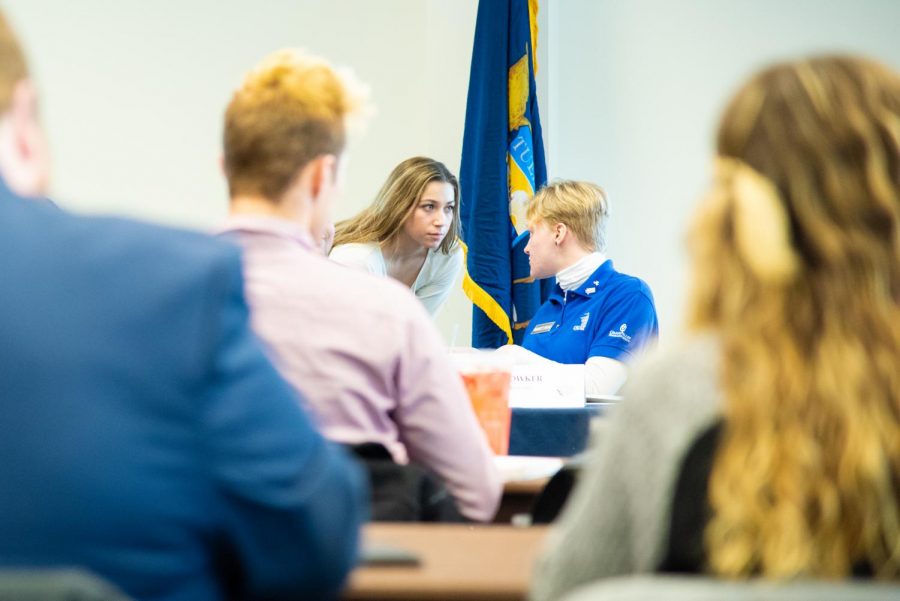Student Senate invites Cook Leadership Academy, discusses higher education funding
Feb 17, 2020
Though the Feb. 13 general meeting adjourned early at 6:16 p.m., Student Senate accomplished plenty. First, senators listened to program managers Grace Tummel and Jakob Bigard discuss the benefits of participating in the Hauenstein Center.
Tummel asked what Student Senate knew about the Hauenstein Center. Senator Kelly Dowker said the Hauenstein Center has the Cook Leadership Academy, and Tummel said the program involves the best and brightest students.
Throughout the one-year program, self-reflection occurs extensively as students think about their strengths and consider how their actions have positive and negative consequences. Participants also attend lectures hosted by the Hauenstein Center. Senators Camilla Russo and Tummel said these events are free and open to the public.
Additionally, Tummel said the academy tries to pair students with mentors by similar interests and personalities. Students meet their mentors six times a year. Here, Tummel mentioned students can ask mentors questions, including what is their leadership style and whether they attended graduate school.
Vice President of External Relations Joel Pagel said he plans on applying for the Cook Leadership Academy. He described it as useful for students navigating the world as leaders, including meeting new people and hearing new ideas. Pagel mentioned the academy would be invaluable for helping students become used to public speaking, including speaking with legislators on education and other issues.
Later, Pagel introduced Resolution W-20-03 on ratifying the Student Coalition for Higher Education Funding (SCHEF). SCHEF serves to bring together student governments from 15 public universities across Michigan to participate more with the state government on educational budgets.
Pagel said it is challenging to fund higher education since the state government has many expenses to pay for everyone living in Michigan, not just students. Budgets range from road maintenance to health.
Furthermore, education funds are distributed by academic performance and other factors. Pagel said Grand Valley State University gets around $3,000 per student. By contrast, he mentioned other universities such as Wayne State receive upwards of $7,000-9,000 per student.
“That slice of the pie is very small for higher education funding,” Pagel said.
Students involved in SCHEF want higher education funding to be fairer. Should funding be increased, Pagel said so much money can go back to GVSU to invest in various improvements and possibly cut tuition costs. However, W-20-03 clarifies any expansion in higher education funding should not take away from preschool through 12th grade education.
Senator Carter Houtman asked whether the wording in the resolution should include a “majority” of student governments. According to W-20-03, SCHEF awaits ratification from “a sufficient number of member student governments.” Pagel said the wording shows other student governments SCHEF is nonbinding. For instance, W-20-03 includes a provision for Student Senate to withdraw from SCHEF at any time.
Nonetheless, Pagel said it is important to get as many student governments involved as possible.
“But if you can get everyone together, I mean hundreds of thousands of students will have their voices heard by their student governments,” Pagel said.
From there, student governments will go to Lansing and let the state government know what is happening at the student level. Pagel said students interested in helping SCHEF can attend the External Relations Committee meetings. These are held in the Student Senate Office Kirkhof Center Room 0008 every Wednesday from 6-7 p.m. Come the Feb. 20 general meeting, Student Senate will vote on W-20-03.
























